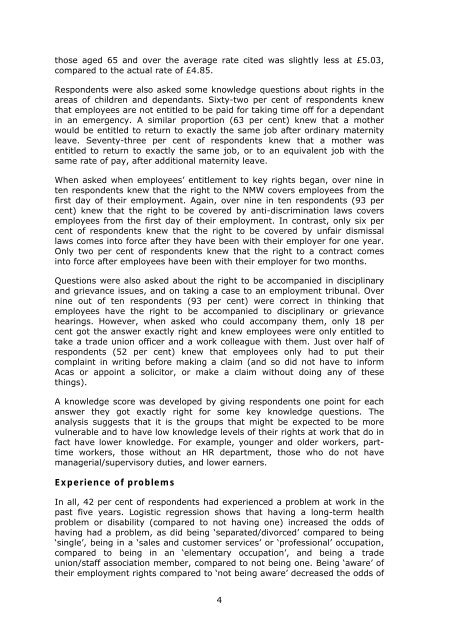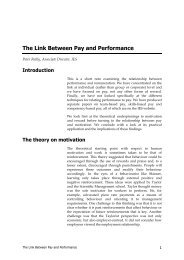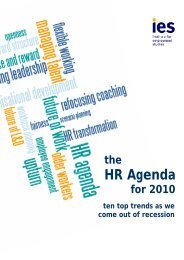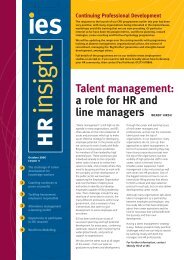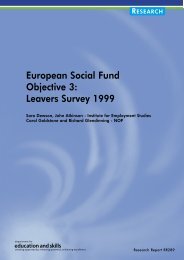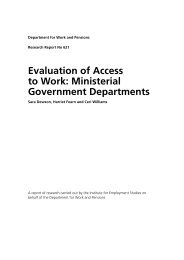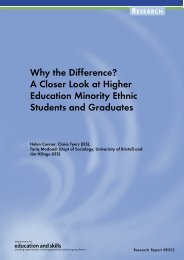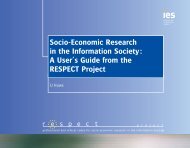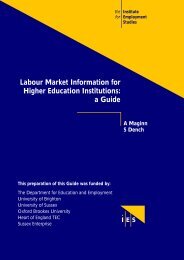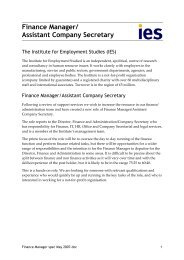Employment Rights at Work: Survey of Employees ... - DTI Home Page
Employment Rights at Work: Survey of Employees ... - DTI Home Page
Employment Rights at Work: Survey of Employees ... - DTI Home Page
- No tags were found...
Create successful ePaper yourself
Turn your PDF publications into a flip-book with our unique Google optimized e-Paper software.
those aged 65 and over the average r<strong>at</strong>e cited was slightly less <strong>at</strong> £5.03,compared to the actual r<strong>at</strong>e <strong>of</strong> £4.85.Respondents were also asked some knowledge questions about rights in theareas <strong>of</strong> children and dependants. Sixty-two per cent <strong>of</strong> respondents knewth<strong>at</strong> employees are not entitled to be paid for taking time <strong>of</strong>f for a dependantin an emergency. A similar proportion (63 per cent) knew th<strong>at</strong> a motherwould be entitled to return to exactly the same job after ordinary m<strong>at</strong>ernityleave. Seventy-three per cent <strong>of</strong> respondents knew th<strong>at</strong> a mother wasentitled to return to exactly the same job, or to an equivalent job with thesame r<strong>at</strong>e <strong>of</strong> pay, after additional m<strong>at</strong>ernity leave.When asked when employees’ entitlement to key rights began, over nine inten respondents knew th<strong>at</strong> the right to the NMW covers employees from thefirst day <strong>of</strong> their employment. Again, over nine in ten respondents (93 percent) knew th<strong>at</strong> the right to be covered by anti-discrimin<strong>at</strong>ion laws coversemployees from the first day <strong>of</strong> their employment. In contrast, only six percent <strong>of</strong> respondents knew th<strong>at</strong> the right to be covered by unfair dismissallaws comes into force after they have been with their employer for one year.Only two per cent <strong>of</strong> respondents knew th<strong>at</strong> the right to a contract comesinto force after employees have been with their employer for two months.Questions were also asked about the right to be accompanied in disciplinaryand grievance issues, and on taking a case to an employment tribunal. Overnine out <strong>of</strong> ten respondents (93 per cent) were correct in thinking th<strong>at</strong>employees have the right to be accompanied to disciplinary or grievancehearings. However, when asked who could accompany them, only 18 percent got the answer exactly right and knew employees were only entitled totake a trade union <strong>of</strong>ficer and a work colleague with them. Just over half <strong>of</strong>respondents (52 per cent) knew th<strong>at</strong> employees only had to put theircomplaint in writing before making a claim (and so did not have to informAcas or appoint a solicitor, or make a claim without doing any <strong>of</strong> thesethings).A knowledge score was developed by giving respondents one point for eachanswer they got exactly right for some key knowledge questions. Theanalysis suggests th<strong>at</strong> it is the groups th<strong>at</strong> might be expected to be morevulnerable and to have low knowledge levels <strong>of</strong> their rights <strong>at</strong> work th<strong>at</strong> do infact have lower knowledge. For example, younger and older workers, parttimeworkers, those without an HR department, those who do not havemanagerial/supervisory duties, and lower earners.Experience <strong>of</strong> problemsIn all, 42 per cent <strong>of</strong> respondents had experienced a problem <strong>at</strong> work in thepast five years. Logistic regression shows th<strong>at</strong> having a long-term healthproblem or disability (compared to not having one) increased the odds <strong>of</strong>having had a problem, as did being ‘separ<strong>at</strong>ed/divorced’ compared to being‘single’, being in a ‘sales and customer services’ or ‘pr<strong>of</strong>essional’ occup<strong>at</strong>ion,compared to being in an ‘elementary occup<strong>at</strong>ion’, and being a tradeunion/staff associ<strong>at</strong>ion member, compared to not being one. Being ‘aware’ <strong>of</strong>their employment rights compared to ‘not being aware’ decreased the odds <strong>of</strong>4


